#ch: henry tilney
Explore tagged Tumblr posts
Text
[Original date: 17 March 2018]
Sadly ignored moments from Austen novels:
In Northanger Abbey, Catherine Morland visits Henry Tilney at home in his parsonage. It turns out that, while he's super outgoing, at home his bffs are his terriers and NEWFIE PUPPIES. Relatably, she ends up playing with the puppies and wondering where all the time went.
In Pride and Prejudice, Elizabeth is stuck handling the coffeepot at a party. She gets angry at people actually wanting coffee, because she wants to exchange longing glances with Darcy and hate everyone else he talks to. Will he come back for a second cup or not? DUN DUN DUN
In Mansfield Park, Fanny doesn't understand why she keeps thinking about how pretty and charismatic and talented her very morally objectionable rival is, or why she keeps visiting her even though she(Fanny) doesn't like her. She confusedly calls it 'a kind of fascination.'
The eighteenth century's version of Discourse Hell was incessant arguments about the value of modern literature compared to the classics. But by Persuasion, the characters are perfectly aware of living in the Romantic era of poetry and think it's GREAT. (In an addictive sort of way.)
The last villain Austen wrote, in Sanditon, is a proto-dudebro who regards himself as a rakish intellectual, but in reality just plots ineffectually while making inaccurate literary references.
#isabel talks#twitter salvage 2023#artist: jane austen#text: northanger abbey#text: pride and prejudice#text: mansfield park#text: persuasion#text: sanditon#ch: catherine morland#ch: henry tilney#ch: elizabeth bennet#ch: fitzwilliam darcy#ch: fanny price#ch: mary crawford#ch: anne elliot#ch: sir edward denham
10 notes
·
View notes
Text
protective husband vibe
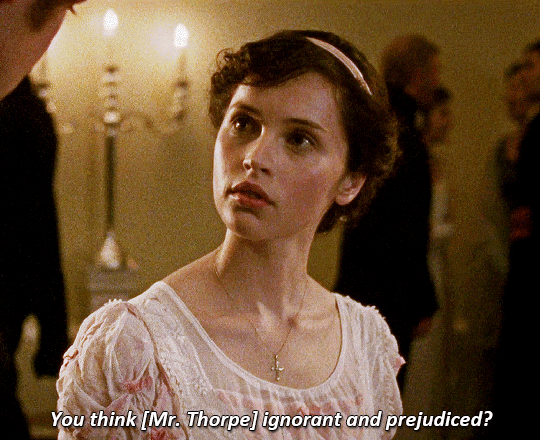


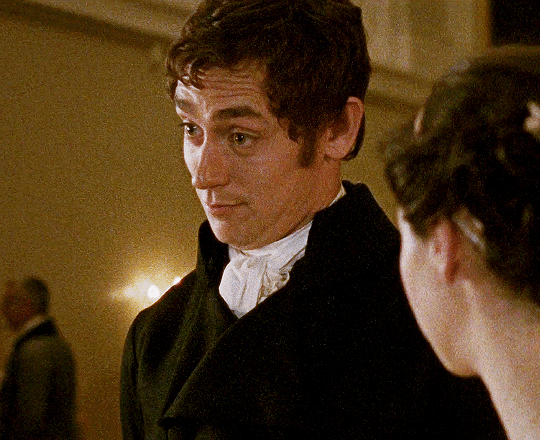
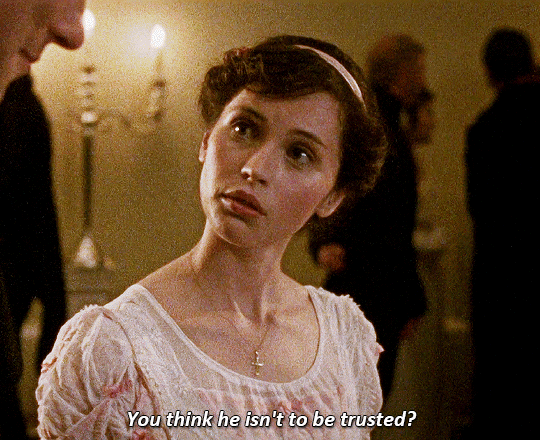


NORTHANGER ABBEY (2007) dir. Jon Jones
1K notes
·
View notes
Text
Northanger Abbey Readthrough, Ch 8
Some hints that Isabella's affection for Catherine may not be all that it seems, starting with this, "Isabella having gone through the usual ceremonial of meeting her friend with the most smiling and affectionate haste" and then Isabella taking an entire three minutes to abandon her friend to dance.
I love this part:
She could not help being vexed at the non-appearance of Mr. Thorpe, for she not only longed to be dancing, but was likewise aware that, as the real dignity of her situation could not be known, she was sharing with the scores of other young ladies still sitting down all the discredit of wanting a partner. To be disgraced in the eye of the world, to wear the appearance of infamy while her heart is all purity, her actions all innocence, and the misconduct of another the true source of her debasement, is one of those circumstances which peculiarly belong to the heroine’s life, and her fortitude under it what particularly dignifies her character. Catherine had fortitude too; she suffered, but no murmur passed her lips.
This sentiment is so real, it's like assuring the waitress that you aren't at the café alone and your boyfriend is coming. Catherine wants people to know that she has a partner! She's not unselected and unknown. It doesn't matter that she may never see these people again, the disgrace is real.
Then worse (!) she finally sees Mr. Tilney again but she can't dance with him! The horrors! I love how Catherine doesn't fall for the "mistakes sibling for spouse" trope, which continues to happen in fiction to this day, but instantly realizes that Henry is with his sister.
Thorpe finally appears (ug) and he doesn't have any good excuse for keeping Catherine waiting. However, this reminds me of three other men:
of the horses and dogs of the friend whom he had just left, and of a proposed exchange of terriers between them
We know that Mr. Rushworth of Mansfield Park also annoyed a woman by talking too much of horses (his "sport" would include this) and dogs:
Maria, with only Mr. Rushworth to attend to her, and doomed to the repeated details of his day’s sport, good or bad, his boast of his dogs, his jealousy of his neighbours, his doubts of their qualifications, and his zeal after poachers, subjects which will not find their way to female feelings without some talent on one side or some attachment on the other Mansfield Park, Ch 12
Also, Sir John and Willoughby are arranging the exchange of some terriers:
Such a scoundrel of a fellow! such a deceitful dog! It was only the last time they met that he had offered him one of Folly’s puppies! and this was the end of it! Sense & Sensibility, Ch 32
Now I'm sure a big part of these quote aligning is just the era and being gentry, them with their fancy horses and fancy dogs, but both Rushworth and Sir John notably can't really talk to women, I think we can easily argue that Thorpe is in the same camp. And inconsiderate Tom Bertram delayed another woman from dancing with concern about horses:
He came towards their little circle; but instead of asking her to dance, drew a chair near her, and gave her an account of the present state of a sick horse, and the opinion of the groom Mansfield Park, Ch 12
The real problem here is that men are putting their concerns above doing a duty or a kindness to a woman. Sir John gets away with his devotion to hunting because he is very kind and accommodating otherwise, but John Thorpe, Mr. Rushworth, and Tom Bertram especially really show their selfishness and self-absorption in these scenes.
ANYWAY, joy of joys, Catherine is introduced to Eleanor Tilney, who seems like 10,000,000% more rational and genuine than Miss Thorpe:
Her manners showed good sense and good breeding; they were neither shy nor affectedly open; and she seemed capable of being young, attractive, and at a ball without wanting to fix the attention of every man near her, and without exaggerated feelings of ecstatic delight or inconceivable vexation on every little trifling occurrence.
Catherine does not immediately become friends with Eleanor, but engages in the very small talk that Henry spoofed back in Ch 3.
The faithless "faithful Isabella" reappears, but she's far too absorbed with James to really focus on Catherine, no matter what she claims. Both Catherine and Isabella refuse to dance with their partners more than once, though like Willoughby and Marianne, Isabella and James don't find new partners but instead talk with each other. Poor Catherine barely spends any time with Mr. Tilney as he got bored and danced with someone else.
Now, we know Catherine is already half in love with Henry at this point, but what is he thinking about her? He does seem to have sought her out and he asks her to dance again. This may just be polite, and he certainly feels that nothing is keeping him from finding another partner. I would say he probably enjoyed the first dance and is happy to see her again, but I doubt he's been dreaming of her...
#northanger abbey readthrough#ch 8#northanger abbey#henry tilney#eleanor tilney#john thorpe#james morland#isabella “faithful” thorpe
26 notes
·
View notes
Text
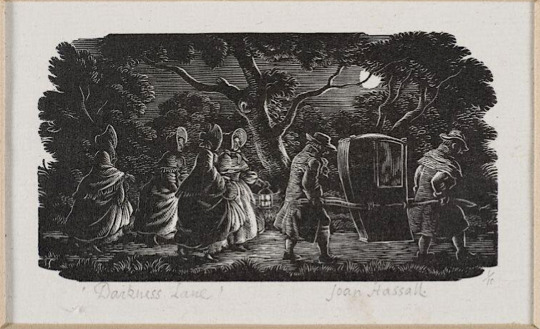
Darkness Lane by Joan Hassall [ x ] - the piece that most inspired my recent woodcut-style piece.
When I found out I was drawing for @gorgeousundertow's regency AU fic, Half Agony, Half Hope, as part of the @ineffableidiotsbigbang, I started looking up Jane Austen novel illustrations for inspiration and ended up finding some really cool art and websites! I'm posting about some of the images and resources I found because I think it may be interesting to others too (and even if it isn't, I'll have gotten the infodump out of my system haha).


Illustrations from Mansfield Park by Joan Hassall [ x ]
The link above points to a gallery on pemberley.com which has deliciously old-school DIY website HTML and a wealth of Jane Austen illustrations, as well as references for regency clothing. This was where I discovered Joan Hassall's work and decided I wanted to do a woodcut style piece (and then subsequently regretted it many times during the process of making it because I had no idea what I was doing). The detail, visual texture and dramatic lighting in her work is so cool and I just got more obsessed the more I saw.
See more Joan Hassall on tumblr via @uwmspeccoll (a very cool account!) here, here, and here.
The gallery on pemberley.com also had a bunch of Charles Edmund Brock illustrations, which I could not get enough of and so returned to the searchpage and found Molland's Circulating-Library. SO COOL! Jane Austen fans have bought illustrated editions of her novels and uploaded scans of them and oh my gosh they are all so beautiful.
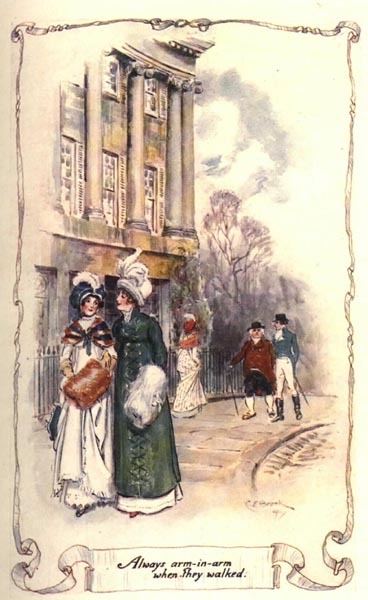
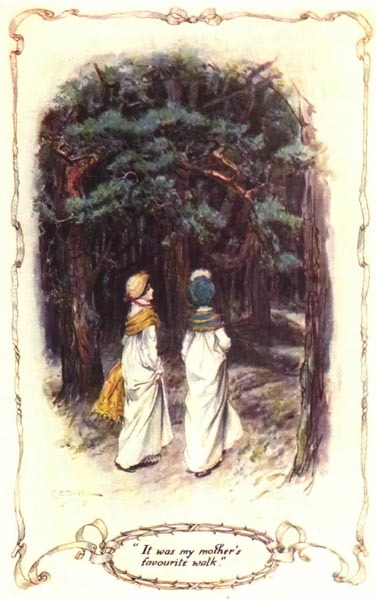
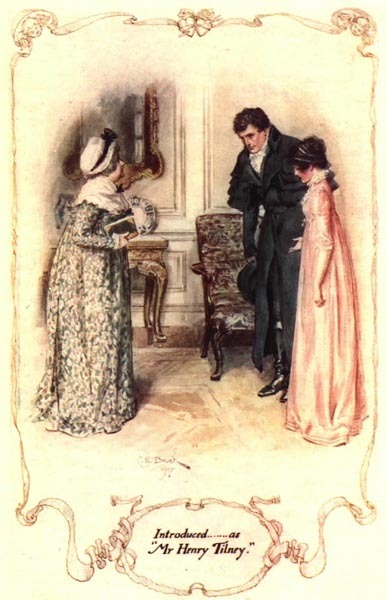
Northanger Abbey watercolour illustrations by C.E. Brock [ x ]
Side note about Henry Tilney (Catherines' love interest in NA), I also came across this old fan page for him from a mostly-broken-links-now site called THE CULT OF DA MAN and um it's great haha, check it out. (reviews of artists representations of him, more delicious HTML, and pixel art (!) of da aforementioned man)
There's also an article on Molland's about Charles and Henry Brock and their Jane Austen works that I found interesting. Charles is better known and did far more JA illustrations, but I do really enjoy Henry's tinted line pieces! (the article also dunks on some bad reproductions of them haha)



Pride & Prejudice tinted line illustrations by H.M. Brock [ x ]
C.E. Brock also did really cool title pages and when I found out that fic banners were a thing I knew what I wanted to do! (with the help of the symmetry tool and undo haha, so much respect for traditional art)



Title pages illustrated by C.E. Brock [ x ] and my banner - the banner design uses elements of both of the Brock images.
So, research in hand/bookmarks folder and banner completed, I decided on a scene from Chapter 10 where our beloveds are standing beside the Thames in the moonlight after walking around London for hours together and talking (CUTE). I wasn't sure what buildings to include in the background, so @gorgeousundertow gave me a few suggestions: Old Southwark Bridge, London Bridge, Southwark Cathedral, and Clink Prison. I realized after a bit of sketching that bridges would be hard to show with the straight-on view I wanted to do, so I decided on the Cathedral, partially because I had also considered drawing a scene that takes place in Salisbury Cathedral in Ch. 7.
OK BUT HOW? I struggled finding reference images for a while until I realized this was LONDON and would be very Google Earth-able. Big ups to Frank Cosgrove, whoever they are, for uploading this haha. This was also where I found out that all the suggestions were from a very small area!


View of Borough High Street, London, 1830, by George Scharf [ x ]
The building in front of the cathedral looked too new, so I went searching for an older image and found the second image. It's a completely different angle but it was enough to get me past the 'oh no idk what do'.
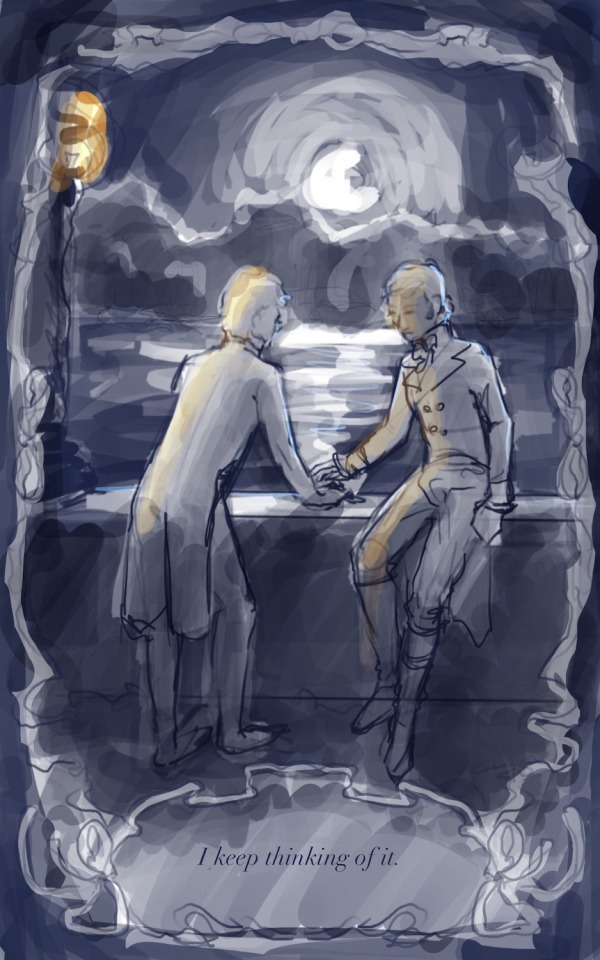

the much brighter concept vs the much darker finished product, featuring a barely-visible Southwark Cathedral
While looking for images of the Thames pre-Google Earth, I also found this website called Dictionary Of Victorian London which has a whole bunch of old images and excerpts from newspapers, etc on a variety of topics. One of the categories, Sex > 'unnatural offences', had this excerpt from The Times (1863), which reads:
Thomas Lane, a coffeehouse keeper, No.9, Love-lane, Eastcheap, city, and James Mortimer, a seaman, were charged with unlawfully meeting each other to commit an unnatural offence. ... The Magistrate committed both prisoners for trial.
Ugh. I hate that so much. Some sexy stuff happens right after the moment I'd chosen, and reading that reminded me that such things would be much more comfortable and safe in darkness (or if ppl just stopped being homophobic, but barring that). I wanted them to feel alone, like the whole world was asleep and it was just them, outside of time.
With that in mind, the iconic Thames Walk Lamp had to go bye bye, and when rendering the background I tried to minimize any light - it's just the suggestion of buildings. I also added tree cover! I tried to imitate how Joan Hassall does trees in some of her artwork, but when she rendered trees like this they were usually farther away/smaller, so my version looks more stylized with how prominent they are.
The ribbon border and book quote presentation is of course more Brock, but by making it black and having the interior image use it as a border instead of a fade-out inside it, I made it a bit of a reference to the very cool foliage edges you see in the very first Hassall image at the top.
I used the procreate brushes from this post on the Procreate Folio forums if anyone wants to try them!
Also fun fact! The font for the quote is called Chanson D'Amour <3 (I initially downloaded it when making the banner before changing the banner font to one called Dark & Black)
------
That's all I have to say about the process for the piece, but here's a comic from Dictionary Of Victorian London, Thames > Sanitary condition that I thought was cute (and gross ig? but also cute):
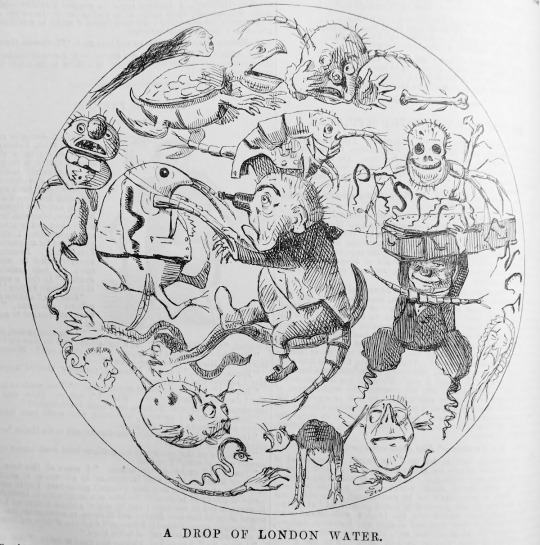
a Punch comic from 1850, I can't link the page due to how the website URL system works but it's from the Thames > Sanitary condition page
#lol anyway back to reading fanfiction from the bang!#joan hassall#charles edmund brock#henry matthew brock#art process#eccles makes#ineffable idiots big bang#jane austen#illustration
18 notes
·
View notes
Photo








Catherine and Henry being cute in Northanger Abbey (2007) (requested by anonymous)
#perioddramaedit#austenedit#northanger abbey#tv: northanger abbey#author: jane austen#ch: catherine morland#ch: henry tilney#19th century#late modern#regency era#europe#shows#gifs#request#maria#northanger abbey*
3K notes
·
View notes
Text
3rd – 6th April: Emma plans a dinner party
Read the post and comment on WordPress
Read: Vol. 2, ch. 16; pp. 189–190 (“Emma, in the meanwhile” to “all disengaged and all happy”).
Context
Emma decides she must not be remiss in welcoming Mrs. Elton. She sends out invitations for a dinner party to the Eltons, the Westons, Mr. Knightley, and Jane Fairfax, all of whom accept.
Note that the last section (“Conscience and Coincidence”) contains spoilers.
Readings and Interpretations
The Social Contract
Michael Suk-Young Chwe, in Jane Austen, Game Theorist, argues that Austen’s novels explore how “social factors such as pride, obligation, and how people think of you can be factors in your preferences commensurate with other factors such as financial need and gratification” (p. 127): “Even the independent Emma […] hosts a dinner for the despised Eltons only because of social sanctions” (p. 128). Per Claudia Johnson, Emma’s concern with these social factors is an admirable trait:
Unlike Mrs. Elton, Emma has a proper regard for public opinion that—with a few very important exceptions—restrains her impulse to abuse. Feelings of “pride or propriety” make Emma “resolve on not being the last to pay her respects” [p. 175] to the new bride, and when her neighbors celebrate Mrs. Elton’s attractions, Emma lets the praise pass “from one mouth to another as it ought to do, unimpeded” [p. 183] by her own dissent. Because Emma does not wish to be “exposed to odious suspicions, and imagined capable of pitiful resentment” [p. 189], she behaves even more politely than she is inclined, while Mrs. Elton degenerates into the blatancy of incivility. The neighborhood that did not exist in Mansfield Park is everywhere in Emma. Emma herself defers to its civilizing restraints and in the process shows conservative ideology working at its best. Henry Tilney had pleaded that the watchful eyes of “voluntary spies” whose good opinion we value will repress the insolence of power, but General Tilney, as we recall, did not care how he treated his little guest or who knew it. But Emma is an authority figure responsive to the morally corrective influence of public opinion. (p. 130)
For David Southward, though, the “embarrassment” that would be caused by the “odious suspicions” of her neighbors is a poor imitation of the “shame” that should arise from a less “superficial sense of virtue” in Emma (pp. 768, 767): he writes that Emma’s
eponymous heroine […] seems more concerned about “being looked at” than she is about “doing wrong.” She holds a dinner party for the Eltons because she “must not do less than others, or she should be exposed to odious suspicions, and imagined capable of pitiful resentment.” In Emma’s mind, the embarrassment of “odious suspicions” far outweighs the shamefulness of her actual resentment, which is itself only an evil when imagined by others. (p. 767)
Southward further takes the conventional tack that Emma must be scolded into morality by Mr. Knightley:
Chiefly through the intervention of Knightley, Emma comes to feel the shame in what had previously only embarrassed her. When Knightley hints that she has perhaps failed to pay due attention to Jane Fairfax, Emma responds with a “faint blush” and quickly dispels her confusion with warm invective against Mrs. Elton’s (for once superior) social graces (4:286). Later we discover that “Mr. Knightley’s words dwelt with her,” that she is indeed “conscience-stricken” over her “shameful” behavior [pp. 189, 190]. (pp. 768–9)
Conscience and Coincidence
John Hagan complicates the conventional reading of Mr. Knightley’s moral tutelage, attributing a different motive to Emma’s determination to pay Jane more attention:
Just as the prospect of Frank turning out to be his rival for Emma’s love arouses Mr. Knightley’s jealousy and hostility, so, earlier, Mrs. Weston’s suggestion that Mr. Knightley might be falling in love with Jane Fairfax aroused Emma’s jealousy and augmented the hostility she had been feeling toward Jane from the beginning. And just as Mr. Knightley’s jealousy and hostility evaporate as soon as he learns the true nature of Emma’s feelings for Frank, so Emma began to feel more conscience-stricken about Jane Fairfax than she had often been” [p. 189]—in fact, adopted her first major resolutions to become more friendly with that girl—the moment Mr. Knightley vigorously dismissed Mrs. Weston’s suggestion as nonsense. […] [T]here is a much greater kinship in fallibility between Mr. Knightley and Emma than our initial impression of them as wise mentor and foolish pupil would suggest. (pp. 545–5)
Footnotes
Is Emma’s dislike of Mrs. Elton morally culpable? Is it admirable that she is moved by public perception of her behavior, or is this a morally insufficient motive?
What causes Emma’s “conscience-stricken” reflections on her past behavior towards Jane Fairfax?
Bibliography
Austen, Jane. Emma (Norton Critical Edition). 3rd ed. Ed. Stephen M. Parrish. New York: W. W. Norton & Company, [1815] 2000.
Chwe, Michael Suk-Young. Jane Austen, Game Theorist. Princeton: Princeton University Press (2013).
Hagan, John. “The Closure of Emma.” Studies in English Literature, 1500–1900 15.4 (Autumn 1975), pp. 545-561. DOI: 10.2307/450010.
Johnson, Claudia L. “Emma: ‘Woman, Lovely Woman, Reigns Alone’.” In Jane Austen: Women, Politics, and the Novel. Chicago: University of Chicago Press, 1988, pp. 121–43.
Southward, David. “Jane Austen and the Riches of Embarrassment.” Studies in English Literature, 1500–1900 36.4 (Autumn 1996), pp. 763–84. DOI: 10.2307/450975.
#Emma#Jane Austen#Emma Woodhouse#Mr. Knightley#Mr. Weston#Mrs. Weston#Jane Fairfax#Mr. Elton#Mrs. Elton#Harriet Smith#e
12 notes
·
View notes
Photo


This thread was an interesting part of twitter discussions that I found over literature characters and how they would predict that they would act during the pandemic. I found two separate replies that mentioned that John Thorpe would be an anti-masker. The replies to this answer also assert this sentiment and describe him as the “*worst.*” This was a particularly interesting thought because I wondered if there was actual evidence for him acting as an anti-masker, or if it was a generalization of taking a disliked character and assuming that he will act in the worst way possible. John Thorpe is certainly insufferable with his constant bragging about carriages and horses, inability to talk about anything outside of himself and his interest, and his disregard for Catherine and her interests, such as novels, but the question does arise if the character was actually understood from the original work or just remembered as being “Fuckboy John Thorpe.” The question arises is John Thorpe really likely to be an anti-masker, or is he just annoying? Is John Thorpe a fuckboy as the tweet claims?
When thinking about how one might define an anti-masker, it is important to note certain aspects that may define them. They are likely to be ignorant and not understand the general consequences of the virus or be very well informed. They are also likely to be selfish and generally disregard the wants and needs of others. John Thorpe certainly does meet some of these qualities with his general lack of knowledge, which he shows in his disdain towards novels and lack of knowledge about them although he pretends to be quite knowledgable of them. His references to Mrs. Radcliffe, easily disputed by anyone who knows the story or anything about Udolfo, are slightly reminiscent of some of the attitudes of anti-maskers and their proclamations on vaccines. Claims such as vaccines being a government chip, leading to infertility, and other absurd claims that could superficially discredit masking, but with any knowledge of the actual subject matter easily be proven to be incorrect. John Thorpe also is most certainly selfish, as he and Isabella are “regardless of everything but [their] own gratification (Ch. 13, pg. 2). This general disregard for others may make him less inclined to do masks that exist for the safety of others rather than themselves.
The second tweet, which claims he may “obnoxiously make fun of anyone who did [wear a mask]” also may root in reflection of Thorpe’s insecure character. He constantly describes his carriage as greater than those around him and brags about his business deals. Catherine understandably finds this intolerable, but this insecurity that results in making himself sound better than others does align with the behavior of anti-maskers. Thorpe could certainly claim that he has better health and has no need to show the weakness that others, such as Henry Tilney, might for wearing a mask. Thorpe’s general disregard for others, lack of knowledge on important subject matter but confidence in his claims, and desire to present himself above others do align with the actions of many anti-maskers. If Mr. Thorpe a “F***boy” as the tweet author claims? This may be more of the general disdain for him seeping in and a slightly inaccurate description of his obsession with himself and wealth rather than women. Generally, though, the public may be on to what John Thorpe would be in 2021.
2 notes
·
View notes
Photo

colors of kisses
cate morland and henry tilney
#the cate morland chronicles#cm chronicles#cate morland#henry tilney#canry#mine#colors of kisses#IVE WANTED TO MAKE THIS SERIES FOR SO LONG BUT THE GIFS WOULDNT WORK#sh: the cate morland chronicles#ch: cate morland#ch: henry tilney cmc#x: cate and henry
54 notes
·
View notes
Text
Ch 14:
“Not very good, I am afraid. But now really, do not you think Udolpho the nicest book in the world?” “The nicest—by which I suppose you mean the neatest. That must depend upon the binding.” “Henry,” said Miss Tilney, “you are very impertinent. Miss Morland, he is treating you exactly as he does his sister. He is forever finding fault with me, for some incorrectness of language, and now he is taking the same liberty with you. The word ‘nicest,’ as you used it, did not suit him; and you had better change it as soon as you can, or we shall be overpowered with Johnson and Blair all the rest of the way.” “I am sure,” cried Catherine, “I did not mean to say anything wrong; but it is a nice book, and why should not I call it so?” “Very true,” said Henry, “and this is a very nice day, and we are taking a very nice walk, and you are two very nice young ladies. Oh! It is a very nice word indeed! It does for everything. Originally perhaps it was applied only to express neatness, propriety, delicacy, or refinement—people were nice in their dress, in their sentiments, or their choice. But now every commendation on every subject is comprised in that one word.”
Link to full text for more
maybe I'm hallucinating this or I read the passage too quickly, but one of my favorite Jane Austen passages of all time is in Northanger Abbey, where Eleanor Tilney, Henry Tilney, and Catherine Morland are having a nice walk. At some point, spurred on by Catherine calling something "nice" or "fine" or "neat" (not sure which,) Henry then goes on this rant grousing about Kids These Days Ruining the English Language, Especially Young Women, and when he's finished his rant, very proud of himself, both Eleanor and Catherine don't say anything and shoot him an absolutely incredulous look. Henry never brings the topic up again.
I love it, tell us how you *really* feel about dudes who mansplain language, Miss Austen, do go off.
...BRB gonna go digging into Northanger Abbey to make sure I'm not hallucinating this
106 notes
·
View notes
Text
Asks about my OTPs
Pick your top 10 OTPs without reading the questions, then answer the questions after you've made your list (I will do my top 10 Austen OTPs)
Catherine Morland & Henry Tilney
Fanny Price & Henry Crawford
Elizabeth Bennet & Fitzwilliam Darcy
Harriet Smith & Robert Martin
Caroline Bingley & Sir Walter Elliot
Elinor Dashwood & Edward Ferrars
Marianne Dashwood & Colonel Brandon
Emma Woodhouse & Jane Fairfax
Eleanor Tilney & her laundry Viscount
Sir Walter & Himself
1. Do you remember the episode/scene/chapter that you first started shipping 6? – When Edward comes to Barton and makes fun of Marianne's love of dead trees.
2. Have you ever read a fanfic about 2? – Yes, my favourite is Fanny: A Mansfield Park Story by Amelia Marie Logan, and I've written severa, including one full length novel.
3. Has a picture of 4 ever been your screen saver/profile picture/tumblr screen saver? – Nope! Always my kids these days.
4. If 7 were to suddenly break up today, what would your reaction be? – This actually happens in FF quite a lot, people are always killing off Brandon early into the marriage and leaving Marianne with a baby. It makes me sad, let Brandon be happy! He's only 37 when they marry he probably has another 20 years at least! (Honestly, since Brandon has survived to his age, Marianne actually has a higher chance of passing away since she's the one making babies).
5. Why is 1 so important? – Because they are so uncomplicated and happy. Just two very cute people making a cute marriage and I would defend their ship to the ends of the earth.
6. Is 9 a funny ship or a serious ship? – Um, it's a whole joke that Austen didn't reveal a new character because the new viscount made a laundry list that Catherine found. But I love Eleanor so much that I do seriously want her to be happy.
7. Out of all the ships listed, which ship has the most chemistry? – Henry & Catherine, Harriet & Robert I think? I may be a bad judge of "chemistry".
8. Out of all your ships listed, which ship has the strongest bond? – Elinor & Edward, I'm always surprised how sure they are of the other's love in spite of of all the obstacles.
9. How many times have you read/watched the 10’s fandom? - I honestly don't know at this point, I read Persuasion once as a teenager and I didn't like it but I LOVED Sir Walter. I've watched all the adaptations (including 1971) and I've read/listened to the book multiple times now.
10. Which ship has lasted the longest? – Sir Walter & himself obviously, that's been going strong for 54 years. I hope it continues until his death at 93. All the others are new pairings.
11. How many times, if ever, has 6 broken up? – The only Austen couple to break up and get back together is Anne & Wentworth, so zero for Elinor & Edward.
12. If the world was suddenly thrust into a zombie apocalypse, which ship would make it out alive, 2 or 8? – Huh, Fanny & Henry or Emma & Jane? They both have a sickly member, which is not great for their odds... Emma is smart but often distracted which would be really bad but Jane is a devoted learner.... Henry would "improve" his estate with zombie moats... I'm voting for both Fanny and Emma don't make it and Henry Crawford & Jane Fairfax find their second true pairing together.
13. Did 7 ever have to hide their relationship for any reason? – Colonel Brandon is attempting to hide his regard out of respect for Marianne and that's why I love him so much.
14. Is 4 still together? – Yes, eating walnuts and petting "her" little cow. Man they are cute!
15. Is 10 canon? – Yep! Though a bunch of the others aren't
16. If all 10 ships were put into a couple’s Hunger Games, which couple would win? – I'm going to put my money on Colonel Brandon, who will do anything to save Marianne. He would be the Katniss and she is the Peeta.
17. Has anybody ever tried to sabotage 5’s ship? – Yes, Mr. Elliot has been trying to prevent Sir Walter from marrying again so he can inherit the baronetcy. He almost succeeds!
18. Which ship would you defend to the death and beyond? – Catherine Morland and Henry Tilney, they are the only couple I can't bring myself to break up in fan fiction.
19. Do you spend hours a day going through 3’s tumblr page? – Um, none? I end up seeing Elizabeth & Darcy stuff no matter what, I have tags on the lesser known Austen characters.
20. If an evil witch descended from the sky and told you that you had to pick one of the ten ships to break up forever or else she’d break them all forever, which ship would you sink? – That is hard because these are my favourite, but I guess Emma can marry boring Knightley instead of having a torrid enemies-to-lovers affair with Jane Fairfax...
I'm not big on chain letters. Thank you @firawren for the tag, if anyone wants to try go ahead!
#otp#jane austen#jane austen fan fiction#and before you yell at me about leaving off canon hero/heroine pairings#They aren't my favourite#I get to pick my own OTPs!#I ship Henry and Fanny starting at Ch 30#I love elinor and edward#I'm not wild about some of the others#Henry tilney supremacy#Henry & Catherine make me die of cuteness
21 notes
·
View notes
Photo










#nothanger abbey#JAFF#catherine morland#eleanor tilney#henry tilney#isabella thorpe#susan morland#jane austen#jane austen with cell phones#I want to do one of these for Emma#But oh the time#ch 11 is when John lies to make Catherine go on a ride with them#I always want to save her from that day#even though it doesn't matter in the end#the only technology they have is cell phones#nothing else
25 notes
·
View notes
Text
Look, General Tilney didn't murder his wife, but can we really blame Catherine for thinking he did when this is how he treats waitstaff?
General Tilney, though so charming a man, seemed always a check upon his children’s spirits, and scarcely anything was said but by himself; the observation of which, with his discontent at whatever the inn afforded, and his angry impatience at the waiters, made Catherine grow every moment more in awe of him, and appeared to lengthen the two hours into four. (Ch 20)
Jane Austen knew that this is the greatest condemnation of a person's character (allow me to headcanon that Henry is exchanging subtle looks of "I'm sorry" during the meal and passing out tips and apologizing before they leave)
87 notes
·
View notes
Text
Henry Tilney, the best Austen hero, has so many positive qualities, but here is one that I appreciate on a very deep level.
Henry does not need to live at Northanger Abbey half the time, he does it for Eleanor.
His sister, he said, was uncomfortably circumstanced—she had no female companion—and, in the frequent absence of her father, was sometimes without any companion at all.
“But how can that be?” said Catherine. “Are not you with her?”
“Northanger is not more than half my home; I have an establishment at my own house in Woodston, which is nearly twenty miles from my father’s, and some of my time is necessarily spent there.” (Ch 20)
Henry Tilney could stay away from his father, as he probably wants to, his financial position is actually pretty secure: Of a very considerable fortune, his son was, by marriage settlements, eventually secure; his present income was an income of independence and comfort... (Ch 31) But he chooses to maintain a room at the Abbey because otherwise Eleanor would be alone with their father. Or just completely alone.
That is real self-sacrificial love.
#henry tilney#northanger abbey#like honestly could he be any hotter?#it's just not even possible#jane austen#it's not just that he knows muslin
497 notes
·
View notes
Note
I once saw someone rank all of Austen's men and of the romantic leads, they rated Henry Tilney last for being "misogynistic." I was VERY confused and had no idea how he could be read that way, especially because he embraces more stereotypical feminine activities like reading novels and picking out fabric. Is there a discourse I'm missing or is that person who made the ranking just stupid?
I believe that sentiment comes from these passages, read in isolation, all from Ch 14:
Where people wish to attach, they should always be ignorant. To come with a well-informed mind is to come with an inability of administering to the vanity of others, which a sensible person would always wish to avoid. A woman especially, if she have the misfortune of knowing anything, should conceal it as well as she can. The advantages of natural folly in a beautiful girl have been already set forth by the capital pen of a sister author; and to her treatment of the subject I will only add, in justice to men, that though to the larger and more trifling part of the sex, imbecility in females is a great enhancement of their personal charms, there is a portion of them too reasonable and too well informed themselves to desire anything more in woman than ignorance. But Catherine did not know her own advantages—did not know that a good-looking girl, with an affectionate heart and a very ignorant mind, cannot fail of attracting a clever young man, unless circumstances are particularly untoward.
and
"Perhaps the abilities of women are neither sound nor acute—neither vigorous nor keen. Perhaps they may want observation, discernment, judgment, fire, genius, and wit." (Henry Tilney)
If one takes all of this commentary seriously, Henry Tilney would come off quite badly, but it's clear the narrator is being facetious and that Henry is making a joke. Eleanor, who understands Henry's humour, does not take offence at all, and it's very clear that Henry loves his intelligent sister. So no, he's not just looking for an idiot to marry and he also doesn't think women are generally stupid. And as you say, his actions throughout the novel prove that he isn't a misogynist, he even takes pains to make Catherine feel better about her hobby of reading novels by admitting to loving them himself.
Taking what Henry says here seriously is equivalent to thinking Elizabeth was serious when she said she started loving Darcy when she saw Pemberley, a comment that her sister laughs at and then begs her to be serious!
I'm curious though, I did encounter a ranking once that rated Willoughby higher than Henry Tilney, was that the same list?
88 notes
·
View notes
Text
Northanger Abbey Readthrough, Ch 3
❤️❤️HENRY TILNEY HAS ARRIVED!❤️❤️
The master of the ceremonies, Mr. King, who introduces Henry Tilney and Catherine Morland is one of the two real people mentioned as characters in Austen's novels (the other being Humphrey Repton in Mansfield Park, a real famous landscaper). Mr. King was retired by the time of publication.
I love Henry's description:
He seemed to be about four or five and twenty, was rather tall, had a pleasing countenance, a very intelligent and lively eye, and, if not quite handsome, was very near it. His address was good, and Catherine felt herself in high luck.
Ah, he is well matched with "almost pretty" Catherine Morland.
Henry Tilney is a lot like a male Elizabeth Bennet, "there was an archness and pleasantry in his manner" and "there was a mixture of sweetness and archness in her manner" (Pride & Prejudice, Ch 10) sound very similar. We also have the descriptions of their eyes being intelligent.
Now because I believe in Henry Tilney Supremacy, let me point out that Henry went to a ball where he didn't know anyone and instead of making everyone else uncomfortable (DARCY!) or just not going and doing his business (Knightley), he uses of the Master of Ceremonies to get a partner and then is just delightful. Darcy begins with insulting Elizabeth and Henry begins by being utterly charming. Just the best guy.
He starts with a hilarious bit, and while Catherine isn't sure if she's allowed to laugh, she's clearly enjoying herself. Then Tilney offers two opposing things for her to write in her journal:
Friday, went to the Lower Rooms; wore my sprigged muslin robe with blue trimmings—plain black shoes—appeared to much advantage; but was strangely harassed by a queer, half-witted man, who would make me dance with him, and distressed me by his nonsense.
or
I danced with a very agreeable young man, introduced by Mr. King; had a great deal of conversation with him—seems a most extraordinary genius—hope I may know more of him. That, madam, is what I wish you to say.
Clearly the second passage is what Catherine would actually write, though maybe not that Tilney was an extraordinary genius. She is having a very good time.
Then they discuss if women or men write better letters. Catherine is unsure that women are superior, and after some gentle teasing Henry basically agrees and says this lovely progressive opinion:
"I should no more lay it down as a general rule that women write better letters than men, than that they sing better duets, or draw better landscapes. In every power, of which taste is the foundation, excellence is pretty fairly divided between the sexes."
And then we get to Henry's most famous attribute, he understands muslins!
Catherine is a bit confused by Henry's behaviour, but she does like it (and him). However, we again have some Elizabeth Bennet vibes with this observation, "Mr. Tilney was polite enough to seem interested in what she said; and she kept him on the subject of muslins till the dancing recommenced. Catherine feared, as she listened to their discourse, that he indulged himself a little too much with the foibles of others"
There are many who think Catherine is too unintelligent to be paired with Henry Tilney, but he clearly has more respect for her than Mrs. Allen, who we are told has, "a trifling turn of mind". She is catching more of his jokes than her chaperone.
She has detected a flaw in Mr. Tilney! (This will apparently be very much forgotten later). Catherine also tells something of a lie, but then is immediately honest about it:
Catherine coloured, and said, “I was not thinking of anything.” “That is artful and deep, to be sure; but I had rather be told at once that you will not tell me.” “Well then, I will not.”
The narrator then points out that it is very bad for a heroine to think fondly of a man before he is known to love her. This is a reference to a ridiculous letter in The Rambler, where it is written: That a young lady should be in love, and the love of the young gentleman undeclared, is an heterodoxy which prudence, and even policy, must not allow. It's pretty nuts, read the whole thing if you are curious.
And we see proof of Mr. Allen's sensibleness, he quickly inquire into Mr. Tilney and finds him to be from a good family and a clergyman. Catherine is being well cared for!
74 notes
·
View notes
Text
Northanger Abbey Readthrough Ch 25
Catherine might have missed like 99% of Henry Tilney's flirting, but she has an inkling it has happened, maybe, "He had—she thought he had, once or twice before this fatal morning, shown something like affection for her."
Which is why I love this meme so much:
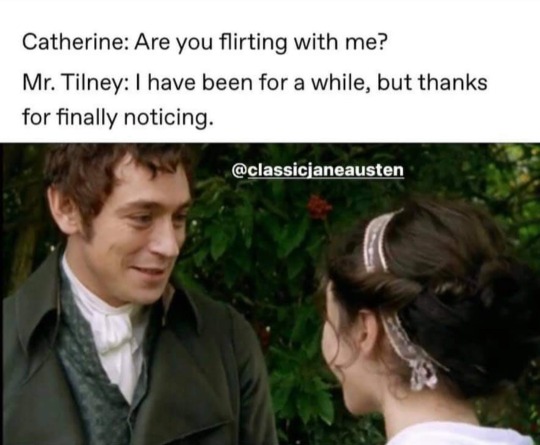
Again, Catherine touches upon Marianne Dashwood behaviour but she just can't really commit, "But now—in short, she made herself as miserable as possible for about half an hour, went down when the clock struck five, with a broken heart, and could scarcely give an intelligible answer to Eleanor’s inquiry if she was well." However, by the end of the evening and with Henry being kinder than ever, she has recovered. she had nothing to do but to forgive herself and be happier than ever; and the lenient hand of time did much for her by insensible gradations in the course of another day. She does indeed bounce back quickly!
Catherine reflects that in England at least, the type of villains described by Mrs. Radcliff must not exist. She doesn't go so far as to pardon France and Switzerland from containing such evil, but she's pretty sure about her own country. She also believes that while Henry and Eleanor may not be perfect (never!), she's certain that General Tilney has some "specks" in his character. Well you've come a long way girl, we won't ask for more just yet.
Murder was not tolerated, servants were not slaves, and neither poison nor sleeping potions to be procured, like rhubarb, from every druggist.
Quick, someone tell Shakespeare!
Now Catherine's thoughts return to Bath, but she has no news. Her faithful friend has proved unfaithful again: But Isabella had promised and promised again; and when she promised a thing, she was so scrupulous in performing it! Oh Catherine...
Not as bad as her brother though! Poor Thorpe is in town: I dread the sight of him; his honest heart would feel so much. Honest heart! That man doesn't have an honest cell in his entire body! I would have more hope for James if we knew he finally figured out John, but the only hint we have is this: the failure of a very recent endeavour to accomplish a reconciliation between Morland and Isabella. So James and John met again and John tried to get them back together, but whether James rejected both siblings or just one is unknown.
I really feel for Catherine here, she has to sit through breakfast trying not to cry, then cannot return to her room because it is being cleaned (bedrooms in this era were mostly for dressing and sleeping, so she wouldn't be expected to use her room again until 4pm*), tries the drawing room only to discover the Tilney siblings, but then they kindly leave her to herself. Catherine needs another half hour (her magical sad-feeling time) before she can face them.
This line from Catherine is so very Jane Bennet:
"Could you have believed there had been such inconstancy and fickleness, and everything that is bad in the world?”
What a stroke was this for poor Jane, who would willingly have gone through the world without believing that so much wickedness existed in the whole race of mankind as was here collected in one individual! -Pride & Prejudice, of Wickham
The poor girls, having their eyes opened to the wickedness of the world.
Then this part:
This post by Fira Wren playing in my head. His kids know the General is full of it. Eleanor is surprised her older brother has fallen in love, since it seems he never has been before, which again has Henry Crawford vibes.
No, not very. I do not believe Isabella has any fortune at all: but that will not signify in your family. Your father is so very liberal! He told me the other day that he only valued money as it allowed him to promote the happiness of his children.” The brother and sister looked at each other.
Now the reason that Isabella Thorpe would lose in a battle to the death against Lucy Steele and Lady Susan is that she didn't keep her first man secure until she had the next engagement entirely locked down. Rookie movie Izzy! I have too good an opinion of Miss Thorpe’s prudence to suppose that she would part with one gentleman before the other was secured. Isabella just could not manage two men at once.
I love this interaction:
This line from Catherine too, "I never was so deceived in anyone’s character in my life before.” and Henry's response: “Among all the great variety that you have known and studied.” has so much in common with this interaction in Pride & Prejudice:
“But perhaps,” observed Catherine, “though she has behaved so ill by our family, she may behave better by yours. Now she has really got the man she likes, she may be constant.” “Indeed I am afraid she will,” replied Henry; “I am afraid she will be very constant, unless a baronet should come in her way; that is Frederick’s only chance. I will get the Bath paper, and look over the arrivals.”
“I did not know before,” continued Bingley, immediately, “that you were a studier of character. It must be an amusing study.” “Yes; but intricate characters are the most amusing. They have at least that advantage.” “The country,” said Darcy, “can in general supply but few subjects for such a study. In a country neighbourhood you move in a very confined and unvarying society.” “But people themselves alter so much, that there is something new to be observed in them for ever.”
Henry also manages to tip us off about his intentions to marry Catherine right under Catherine's oblivious nose!
"Prepare for your sister-in-law, Eleanor, and such a sister-in-law as you must delight in! Open, candid, artless, guileless, with affections strong but simple, forming no pretensions, and knowing no disguise.”
“Such a sister-in-law, Henry, I should delight in,” said Eleanor with a smile.
Catherine also realizes that she feels much less sad about losing Isabella than she thought she would, which Henry tells her to think about. The falseness of Isabella's friendship is dawning on Catherine, perhaps now just unconsciously.
*Quote illuminating this point from Wives & Daughters by Elizabeth Gaskell, spoke by a character who would have been young during the Regency era: 'No, no, Cromer: bedrooms are for sleeping in, and sitting-rooms are for sitting in. Keep everything to its right purpose, and don't try and delude me into nonsense.' Why, my mother would have given us a fine scolding if she had ever caught us in our bedrooms in the daytime. We kept our out-door things in a closet downstairs; and there was a very tidy place for washing our hands, which is as much as one wants in the daytime.
54 notes
·
View notes